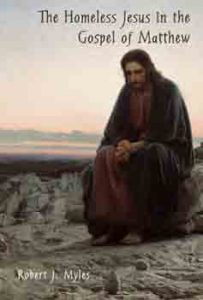The following response by Dr Hector Avalos to Dr Robert Myles‘ review of The Bad Jesus was originally posted on Debunking Christianity and is reposted here with permission.
Dr Robert Myles and The Bad Jesus: An Androcentric Defense of Family/Household Abandonment?
By Dr. Hector Avalos
Dr. Robert Myles of the University of Auckland (New Zealand) has reviewed The Bad Jesus in two parts available here and here.
He is the first biblical scholar to perform such a review of The Bad Jesus on the blogosphere. I was especially interested in his comments because he specializes in New Testament and Christian origins, as well as in Marxism and critical theory.
 Myles is also the author of The Homeless Jesus in the Gospel of Matthew (Sheffield: Sheffield Phoenix Press, 2014), which treats a few of the subjects I do.
Myles is also the author of The Homeless Jesus in the Gospel of Matthew (Sheffield: Sheffield Phoenix Press, 2014), which treats a few of the subjects I do.
That book offers many provocative observations, and I recommend it to anyone interested in issues of poverty and homelessness in the Bible. His book came to my attention too far into the editing process of my book, and I did not include it in my discussions. I did read it by the time I wrote this post.
Although Myles’ review raises some interesting questions, it ultimately does not represent my arguments very accurately or address them very effectively. I will demonstrate that his review actually is, in part, an androcentric defense of the abandonment of families by Jesus’ disciples. I will address the objections he raises against my methodology and my discussion of Jesus’ view of abandoning families, especially in the case of the men he called to be his disciples in Mark 1:16-20 because that is one main example Myles chose from my book.
MYLES AND METHODOLOGY
 To understand how Myles misrepresents or misunderstands the purpose and method of my book, it may be useful to begin with the introductory summary of the book that I provided on pages 8-9 of The Bad Jesus:
To understand how Myles misrepresents or misunderstands the purpose and method of my book, it may be useful to begin with the introductory summary of the book that I provided on pages 8-9 of The Bad Jesus:
- Biblical scholarship is still primarily a religionist apologetic enterprise despite claims to be engaging in historico-critical and descriptive scholarship.
- A more specific Christian orientation is clearly revealed in the manner in which the ethics of Jesus are predominantly viewed as benign and paradigmatic, even among supposedly secular academic scholars.
- However, many of the fundamental ethical principles announced or practiced by Jesus actually would be antithetical to those we otherwise describe as ‘acceptable’ or ‘good’ by some of the most widely accepted standards of ethics today.
- Accordingly, such a predominantly benign view of Jesus’ ethics signals a continuing acceptance of Jesus as divine or as morally supra-human, and not as the flawed human being who should be the real subject of historico-critical study.
Myles diverts his attention from my stated purposes to a critique of neoconservative or capitalists ideologies. Such critiques of neoconservatism or modern capitalism may be sound, but they are not the most relevant to my argument about how Jesus is treated in New Testament ethics. According to Myles:
Methodologically, Avalos’ book is weak, which is unfortunate as I think the broader argument has a lot of merit. Avalos self-identifies as a a [sic] New Atheist. This perspective holds that theism is generally destructive and unethical. It is embodied for example in the writings of Richard Dawkins, Sam Harris, and Christopher Hitchens. What Avalos doesn’t explore is how this movement has also tended to form strong associations with a neoconservative political ideology, perhaps expressed most triumphantly by the late Christopher Hitchens. In and of itself this might not appear overly relevant, but its importance will become obvious shortly.
There are two problems with this criticism. First, Myles left out that I identified myself with a “Second Wave” of New Atheism on p. 15 of The Bad Jesus:
So, perhaps, one can view atheist biblical scholars as ‘Second Wave New Atheists’ to contrast with the non-biblical scholars that dominated the first wave. Readers should view the present work as the first systematic New Atheist challenge to New Testament ethics by a biblical scholar.
Indeed, I explicitly named Dawkins, Hitchens, Harris as being part of that First Wave from which I was differentiating myself.
My agreement with the New Atheism was qualified as follows: “Insofar as I believe that theism is itself unethical and has the potential to destroy our planet, I identify myself with what is called ‘the New Atheism” (p. 13). Myles’ review erroneously assumes that I identify with the New Atheism insofar as every other ideological or capitalist feature he identifies.
Continue reading “Hector Avalos Responds to Robert Myles’ Review of The Bad Jesus“

